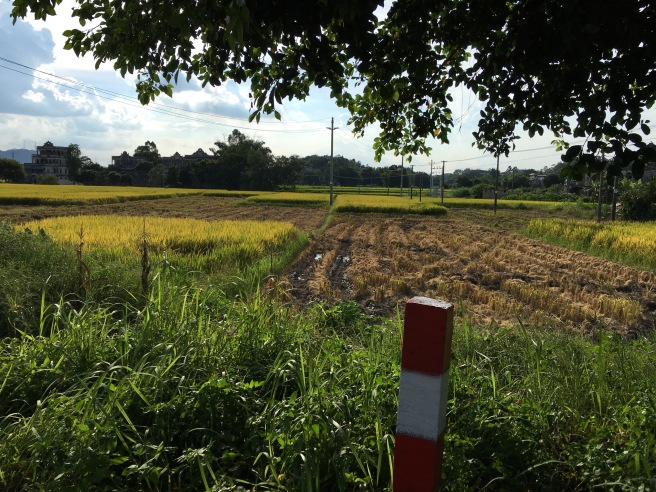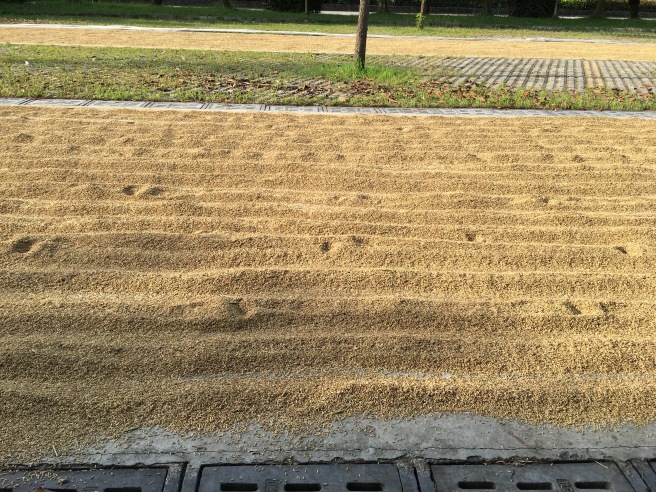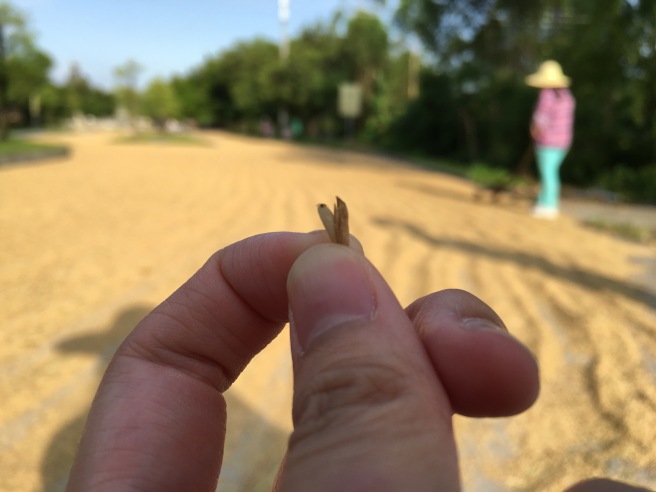It’s time to harvest the rice! Every day over the past week in Zhou (周) Sir’s van, I’ve listened everybody remark on the color of the rice paddies. “Ah! It’s so golden! It’s so pretty! It’s time to cut!”
In this one week in Guangdong (广东), I’ve heard many, many things and I’ve seen many, many things. Due to the initial complications of not having wifi at my auntie’s house (or, if I ever did have wifi, I had no VPN, which, in China means having no access to Google, Facebook, or my main email account, WHICH for me meant that I just had no internet) along with the million-watt culture shock, I was not able to blog my first week in Guangdong. I did take sparse notes between my phone and a word document on my laptop titled “blog” but I am irreparably behind on telling you about the bajillion things that happened last week, so I will just skip it all.
Back to Monday June 27! Today!
This morning I moved from Auntie Sim’s house at Helenbergh (海伦堡) in downtown Kaiping to the Cangdong (仓东) Education Project’s youth hostel in the real Kaiping countryside about a 20 minutes’ drive away. I brought my one medium sized suitcase which I had thought was humble in size for a summer’s cross-Pacific luggage but I am always somehow the most ridiculous and superfluous American tourist-looking kid around the block. I also brought the bamboo sleeping mat and mosquito net that I bought the supermarkets that I walked to in downtown Kaiping. I had chosen the cheapest ones, which were 104¥ and 46¥ respectively, but still. Around here, I am always ridiculously extravagant. There are already plenty of mosquito nets and bamboo sleeping mats available at the Cangdong hostel. They even have hair dryers. Anyways, I am really pumped and ready for the countryside.
The Cangdong hostel is located not in the Cangdong village but in the Tangkou (糖口) village.
This morning, a group of government officials from the Guangdong province level came to visit Cangdong village. They arrived around 10 AM in a small bus that I assume is also air-conditioned. It’s really hot here. Blisteringly hot and humid. In Cantonese, we’d say that rivulets of sweat “scratch” down your skin. Well, that’s sort of the translation. Anyways, the government officials went into the ancestral hall, got some tea, and listened to Professor Selia Tan deliver a PowerPoint presentation about the Cangdong Project. Then they discussed some stuff, which I didn’t really pay attention to. They all spoke Mandarin. I only know how bad my Chinese is after coming to China. All of my Chinese. My Cantonese, my Mandarin, my Kaiping dialect, it’s all embarrassing. My Chinese is perfectly adequate, but I mean, I only know now how unimpressive it is…
So the officials toured Cangdong village for about 1 minute and then around 11am they entered their bus and left. Rocky and CJ explained to me that the government officials were mainly talking about their economic concerns for Cangdong and their questions about why Cangdong isn’t more ambitious about attracting tourists.
Rocky then left for Hong Kong for a couple of days with his sisters and niece, CJ went to city center and then it was just Nana and Grandpa Deng (邓伯) and me. Grandpa Deng is the caretaker of the hostel. Nana is like the social media assistant manager… CJ is another assistant manager who was also super involved with all the architectural restoration projects. I think that if I just sat with nobody but him the entire summer with questions about the Diaolou, I’d have a pretty solid report for the fellowships office. He’s actually working on some serious design projects, and he showed me stuff on SketchUp, stuff he’s been working on for at least two years, like a seed research facility nearby, and the Tangkou library and new hostel restoration across the street from the current hostel. He lives here too, except I think he just went home tonight and I don’t know when he’ll be back. I don’t even really know exactly what’s going on. I’m surprised Rocky invited me so much to everything going on with the Cangdong Project. I tag along like an extra intern, or a special visitor. Although, on that note, Rocky did explain that the Cangdong Project is pretty invested in sharing this area’s culture with overseas Chinese (华侨), since this is where we all came from. I feel really lucky to have come across this non-profit group researching the cultural heritage of this area.
Ah, it’s late but I’ll try to make things short. In the afternoon I had biked to Zili Village (自力村), but I had forgotten my student ID at Tangkou so I didn’t enter. Though it feels like everything is really cheap here, I remember what Mallory said about the Czech Crown when she was studying in Prague, “You feel like everything is really cheap but you have to be careful. You could actually end up spending more than in the United States because it all adds up!”
I wanted to watch The Grandmaster (一代宗師) in Cantonese with Grandpa Deng, since he’s never seen it and he’s from Chikan. Wong Kar Wai filmed the Grandmaster in Chikan. Though I’m fine with watching Mandarin, Grandpa Deng said he doesn’t understand Mandarin that well, so I tried really hard to find a Cantonese version. But! I couldn’t find a Cantonese version! The closest I found was renting on Amazon and it was the original sound, meaning only Tony Leung spoke Cantonese while the rest of the cast spoke Mandarin… errrghhh if it’s filmed in Chikan, Guangdong, and produced in Hong Kong, how could they not have a more accessible (AKA easy to stream for me) Cantonese version!
Then, Nana took me for a bike ride around five o’clock, because she wanted to swing by Liyuan (立园), or Li Gardens. There were farmers drying grains there, working hard under the scorching sun, spreading the grains out with these hoes that look like combs. A bag of grains from that point on is sold for about 100 RMB. That’s so little.
We helped them a bit on gathering the grains for the evening — tomorrow they still have to finish drying.
Piles and piles of grains are laid out over as much sunny road as there is available. Don’t ask farmers what happens if it rains! It is inauspicious!
“粒粒皆辛苦” is something my grandma and mom said a lot when I was younger, because I’d never finish my rice. “Each grain of rice is earned through suffering.” They’d also say that for each grain of rice I leave behind in my bowl, that’s going to be a pimple on my future husband’s face!
Here is a stray grain that flew into the grass. Look at the little rice inside the peeled open shell.




I enjoy reading about your immersed experiences while you are back in China, especially because you writing is conversational and I can even hear your humor (the moment you couldn’t find “accessible” movies to stream). As for the “inexpensive” prices in the communities, I agree with Mallory that prices do add up, but I also try and keep in mind the economic context ; what may considered cheap for American travelers may actually be a reasonable or high cost for individuals who live in the economic system. I also find myself being joyful for the “cheap” prices, but translating our money in such a way can undermine the actual (laborious) worth for food, services and goods. (DISCLAIMER: I know very little to nothing about macro or micro economics….my comment is based solely on limited 21 yeas of experience!)
LikeLike